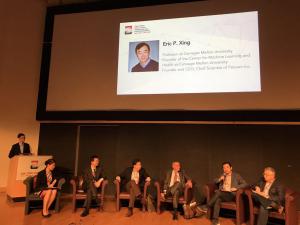CMU SUMMIT on US-China Innovation and Entrepreneurship turns spotlight on developments of cutting-edge technology
Exceptional results in smart medical imaging application
PITTSBURGH, PENNSYLVANIA, THE UNITED STATES, April 27, 2017 /EINPresswire.com/ -- At the sixth CMU SUMMIT on US-China Innovation and Entrepreneurship which was held as scheduled recently under the theme of “promoting innovation, connecting talent, embracing challenges”, the elites in science and technology, top financial investors, social entrepreneurs and students from well-known universities in China and the U.S. gathered in the U.S. Carnegie Mellon University in Pittsburgh, and held in-depth discussion on artificial intelligence, robotics, mobile medical care, big data, and VR and other areas regarding the new trends of cutting-edge technology, pointing out the directions for the global science and technology development trend.Carnegie Mellon University is known worldwide for its research in computers, robotics, artificial intelligence, and big data. The first CMU SUMMIT on US-China Innovation and Entrepreneurship was held in 2011. For six years since its inception, the summit, which is aimed at promoting the dialogue and cooperation between the Chinese and U.S. universities, enterprises and governments in various fields, has evolved into the largest U.S university innovation and entrepreneurship summit with the most powerful participants.
What role does the smart mobile medical imaging play and how to apply it better and faster in the world has become one of the hot topics in the summit. How to leverage mobile medical means to improve the quality of diagnosis and enable medical imaging to provide more convenient, efficient and accurate services for patients has become a major issue. In the medical session of this summit, many guests discussed and explored the topic of medical artificial intelligence in detail.
Prof. Eric Xing, Founder, CEO and Chief Scientist of PETUUM:
Medical imaging artificial intelligence field faces favorable opportunities and its in-depth research and development is just at the right time.
As a world-leading platform for artificial intelligence and machine learning, PETUUM is jointly developed by the UPMC (University of Pittsburgh Medical Center) and CMU. Based on natural language processing, image and video analysis, computational genomics, and pan-omics, it uses multidimensional heterogeneous data sources to provide precision personalized medical and intelligent hospital research and development services, as well as the big data technology used in the medical industry including mobile and wearable equipment, and medical data privacy security.
The cooperation between Wingspan Technology and PETUUM is made at just the right time. Through the close combination, the two sides are sure to harvest significant results in the in-depth research and development of medical imaging artificial intelligence sector, said Xing Bo.
Bian Haifeng, CTO of Wingspan Technology:
Intelligent medical imaging is the inevitable choice for the development of the medical imaging industry
In my view, the fact that the smart medical imaging is the inevitable choice for the development of the medical imaging industry is attributed to two main reasons. Take China for example. The first reason is the rapid development of medical imaging, but there is a lack of doctors and there is a certain misdiagnosis rate. Data shows that China produced 1.44 billion pieces of film in 2015, and this figure is mounting at an annual rate of 30%. But there are only 170,000 registered professional imaging doctors, with a growth rate of only 4.1%. According to misdiagnosis data from the Chinese Medical Association, 57 million people require clinical care in China each year and this figure is 12 million in the U.S. This figure is high in both countries. The second reason is the concentration and high frequency. Less than 3% of hospitals in China admit 40.9% of patients. This concentration of people has given rise to difficulty in receiving medical treatment. Thus, you see the Chinese government is making unprecedented efforts to promote the policy of hierarchical diagnosis and treatment. Meanwhile, the people aged above 55 occupy upwards of 50% of the medical resources. In addition, China has 230 million elderly people. Physical check for sub-health, chronic disease management, and the rehabilitation process requires the support of medical imaging. So, under the rigid demand, medical imaging witnesses rapid development, so as to meet the huge market needs.
So, what changes can smart medical imaging bring? The guests have reached a consensus that smart medical care has significant advantages in improving the quality of medical care and reducing medical costs and so on. In-depth study in this area is beneficial to removing the dependence of traditional medicine on experience, and then using modern big data analysis means to achieve the bright future of evidence-based medicine. This will bring people new experience in three aspects: a worry-free mind, more convenient services, and more accurate diagnosis.
Dai Xuefeng
Suchwill Communication
+86 1336 688 0135
email us here
Legal Disclaimer:
EIN Presswire provides this news content "as is" without warranty of any kind. We do not accept any responsibility or liability for the accuracy, content, images, videos, licenses, completeness, legality, or reliability of the information contained in this article. If you have any complaints or copyright issues related to this article, kindly contact the author above.



